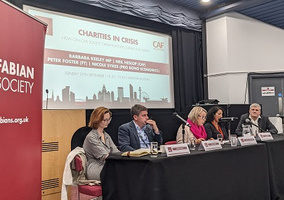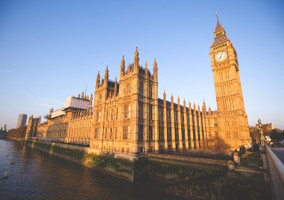Charities should be vocal about the possible impact of welfare cuts and the cost-of-living crisis, delegates heard at the Directory of Social Change (DSC's) annual online conference yesterday.
Duncan Shrubsole, director of policy, communications and research at The Lloyds Banks Foundation said “we need government to play its part” during the cost-of-living crisis, by giving more funding to charities and offering better help for individuals, such as upping benefits.
Shrubsole described the government as having recently got into an “absolute mess”, adding “we need to kick up the biggest stink possible”.
He accused the government of acting without a mandate and suggested its planned public spending cuts were not legitimate.
‘We are not going to be quietly picking up the pieces’
Shrubsole said that as environmental charities have begun to be “more vocal” in their campaigning, anti-poverty charities should tell politicians that they “are not going to be quietly picking up the pieces”.
He emphasised charities should not be party political but can “stand up for our cause”. In regards to cuts to public expenditure, Shrubsole said other groups will be vocal, so if the sector is not loud there is a “danger we will get squeezed out”.
Andy Coish, head of partnerships at Hull & East Riding Citizens Advice Bureau, said striking the balance with campaigning can be quite a challenge, and it is “hard to be neutral when you see so many people suffer”.
But Coish said “we can't throw eggs...because that usually splats back”. Instead he advised charities to show their value through case studies, which are often “terribly powerful”.
Though it can be a “difficult balance” he suggested the sector keep knocking on the door, as change can happen.
Shrubsole added that because the cost-of-living crisis is so all-encompassing, case studies bring it to life, and mean politicians can mention them in debates.
He added the sector needs to make sure charities are at the forefront in the minds of the government when it comes to energy costs.
“It is not about party politics, it is about showing the realities of the issues you are facing and how you are responding to them,” he said.
Carol Mack, chief executive of the Association of Charitable Foundations (ACF), also advised charities and voluntary sector groups to recognise when government does act, and say when changes are good.
Foundations cannot ‘meet all of the demands’ of the crisis
Mack spoke about the important role foundations can play in supporting organisations to respond to the cost-of-living crisis.
Nonetheless, she said they “cannot possibly meet all of the demands” and “only the government” can act on the required scale.
She noted some grantmakers have adjusted pre-agreed funding, have been looking at increasing multi year grants, and have been making other important changes.
Mack advised charities to speak to current funders if they need help as a result of the cost-of-living crisis and advised charities not to “underestimate your power” as foundations can't achieve without charities.
Charities facing ‘triple whammy’
Shrubsole said the charity sector was facing a “triple whammy” from the cost-of-living crisis. Including:
- Increased demand.
- Pressure on charities own costs and income.
- Pressures on staff and volunteers.
He added the crisis “did not fall from the sky” and has been “building for some time”.
Shrubsole said recognising the value of small and local charities is important as they have a “key role to play” in the cost-of-living crisis.
Related Articles












